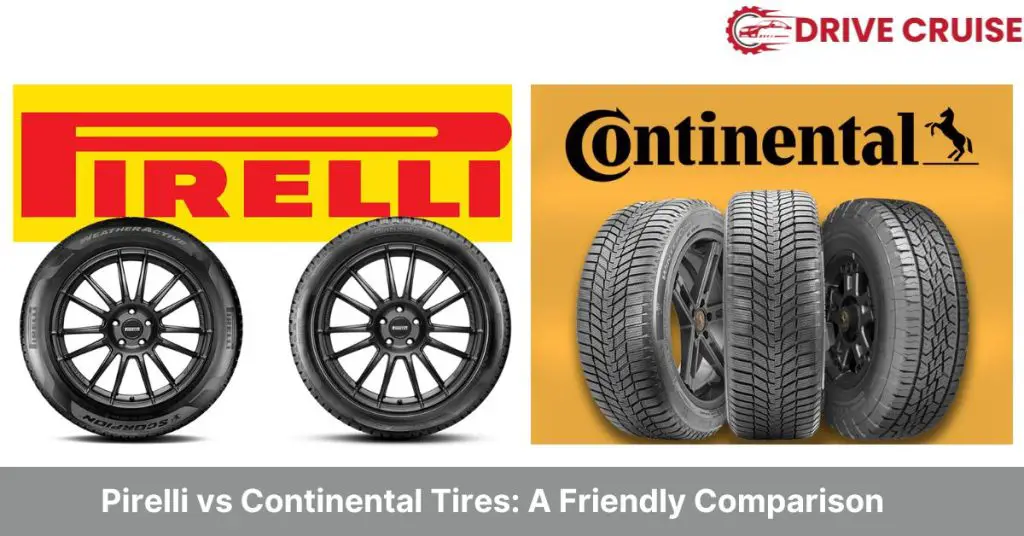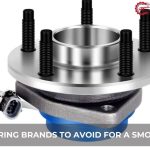When it comes to choosing tires for your vehicle, the options can be overwhelming. Continental and Pirelli are two of the most well-known tire manufacturers in the world, offering a wide range of options for various driving styles and vehicle types. Understanding the strengths and weaknesses of each brand is crucial to ensure optimal performance for your specific needs.
Pirelli is the world’s second-oldest tire company, founded in 1872 by Giovanni Battista Pirelli in Milan, Italy. Today, Pirelli is the sixth-largest tire company in the world, known for its high-performance tires that offer excellent traction and responsive handling. On the other hand, Continental is a German company that has been in the tire business for over 140 years, offering reliable performance at a more affordable price point.
Both brands offer a range of tire models, with most lasting between 45,000 to 65,000 miles. However, the mileage warranty and average lifespan of Continental and Pirelli tires differ slightly. Continental offers a treadwear warranty of up to 80,000 miles, while Pirelli provides a warranty of up to 65,000 miles. Understanding the differences between these two brands can help you make an informed decision when choosing the right tires for your vehicle.
Continental: All-Season Capability and Everyday Comfort
Focus on Balanced Performance
When it comes to developing all-season tires that perform well in a variety of weather conditions, Continental has a reputation for excellence. The advanced all-season tread design of Continental tires includes deep sipes for snow traction, wide grooves for water evacuation, and varied tread block patterns for dry handling. Depending on the tire line, Continental also employs specific technologies to enhance all-season performance. For example, some Continental tires feature silica-infused tread compounds for wet grip and innovative tread patterns for noise reduction.
Emphasis on Comfort and Refinement
In addition to their all-season capability, Continental tires are also designed with comfort and refinement in mind. Comfort-oriented construction features like high-ply construction and noise-dampening materials within the tread contribute to a smooth and comfortable ride. User reviews also indicate that Continental tires are often praised for their low noise levels and overall ride comfort.
Pirelli: Geared Towards Performance Enthusiasts
If you’re a performance enthusiast, Pirelli tires might be the perfect choice for you. Pirelli has a reputation for designing tires that prioritize dry grip, responsiveness, and handling prowess. Here’s what you need to know:
Prioritizing Handling and Grip
Pirelli’s focus on performance is evident in their tread design. The wider contact patches and aggressive tread patterns with lower tread depth (depending on the tire line) provide maximum grip. Pirelli’s summer tread compounds are optimized for dry performance, making them ideal for high-performance driving.
Pirelli also utilizes specific technologies to enhance handling. For example, their high-performance carcass construction provides better cornering stability, while innovative tread compounds increase grip.
Potential Trade-Offs for Everyday Use
While Pirelli’s performance focus might be great for track days, it might lead to trade-offs for everyday driving. Here are a couple of things to keep in mind:
Wet Weather Performance
Some Pirelli tires might prioritize dry grip over wet weather performance compared to Continental’s all-season offerings. User reviews and independent testing results can be helpful in determining which tire is right for you.
Ride Comfort and Noise
High-performance Pirelli tires might generate more road noise and potentially offer a firmer ride compared to Continental’s comfort-oriented options. Keep this in mind if you’re looking for a comfortable, quiet ride.
Making an Informed Decision: Continental or Pirelli?
When it comes to choosing between Continental and Pirelli tires, there are several factors to consider to ensure an informed decision. Both brands offer a wide range of options and are renowned in the tire industry. In this section, we’ll explore some important considerations to help you choose between Continental and Pirelli tires.
Prioritizing All-Season Capability and Comfort
If you prioritize a balanced all-season tire with good wet weather performance, comfortable ride quality, and quieter operation, Continental could be a strong contender. Continental tires are known for their superior wet weather performance and comfortable ride. The brand offers a range of tires that cater to different driving styles and needs. Continental also provides a treadwear warranty of up to 80,000 miles, making it a reliable choice for long-lasting tires.
Seeking Performance and Grip for Spirited Driving
Drivers who prioritize dry handling, responsiveness, and a more engaging driving experience might find Pirelli tires to be a better fit. Pirelli tires are known for their sporty performance and excellent grip on dry roads. The brand offers a range of tires that cater to different driving styles and needs. Pirelli provides a warranty of up to 65,000 miles, making it a reliable choice for long-lasting tires.
Considering Your Driving Style and Needs
It’s important to consider your typical driving conditions (weather, highway vs. city), performance expectations, and comfort preferences when making your choice. If you frequently drive in wet conditions, prioritize a tire that offers good wet weather performance. If you prioritize a comfortable ride quality, look for tires that offer a smoother and quieter ride. If you enjoy spirited driving and prioritize performance, look for tires that offer excellent grip and handling.
Consulting a Tire Professional for Personalized Recommendations
We recommend consulting a trusted tire professional for personalized advice based on your vehicle type, driving style, and budget. They can help you compare specific Continental and Pirelli tire lines to find the best option for your needs. A tire professional can also help you understand the differences between Continental and Pirelli tires, and help you make an informed decision.
Conclusion: Matching the Right Tire to Your Driving Experience
Now that you have seen the core strengths of Continental and Pirelli tires, it’s time to consider your driving needs and priorities to make an informed decision. If you live in an area with harsh winters, Continental tires with their all-season focus may be the best fit for you. They offer excellent traction on snow and ice, making them a safe choice for winter driving.
On the other hand, if you are looking for high-performance tires that deliver excellent grip and handling, Pirelli tires may be the way to go. They offer responsive handling and precise steering, making them a great choice for sports cars and performance vehicles.
It’s important to remember that selecting the right tire is crucial to ensuring optimal performance and a safe driving experience. You should consider factors like your driving style, the type of vehicle you have, and the road conditions you typically encounter.
Consulting a professional is always a good idea when selecting tires. They can help you choose the right tire for your specific needs and recommend a tire that will deliver the performance you desire.
In the end, whether you choose Continental or Pirelli tires, make sure you prioritize your driving experience and select a tire that will meet your needs. By doing so, you can enjoy a smooth and safe driving experience, no matter where the road takes you.
Related Posts:
- Achilles Tires Review: Are They Worth the Investment?
- Can Teslas Use Gas? Exploring the Fuel Options for Electric Cars
- Continental vs Pirelli Tires: Which One Should You Choose?
- Honda Pilot Emissions System Problem: Causes and Solutions
- FCM Service Required: How to Get Started with Firebase Cloud Messaging
- Honda Pilot Keyless Start System Problem: Troubleshooting Tips
- How Many Wheels Are in the World: A Fascinating Look at Global Transportation
- Hyundai Check BSD System: How to Ensure Your Safety on the Road
- Michelin vs Pirelli Tires: Which One Should You Choose?
- Chevy Volt P1E00: What You Need to Know
- Pirelli vs Continental Tires: A Friendly Comparison
- Toyo Open Country H T II Review: A Friendly Look at Its Features and Performance
- Yokohama Geolandar MT G003 Review: A Friendly Guide












